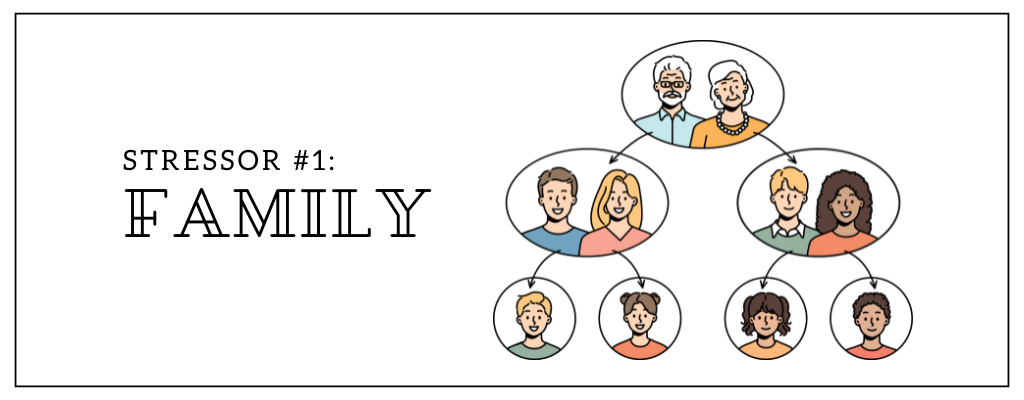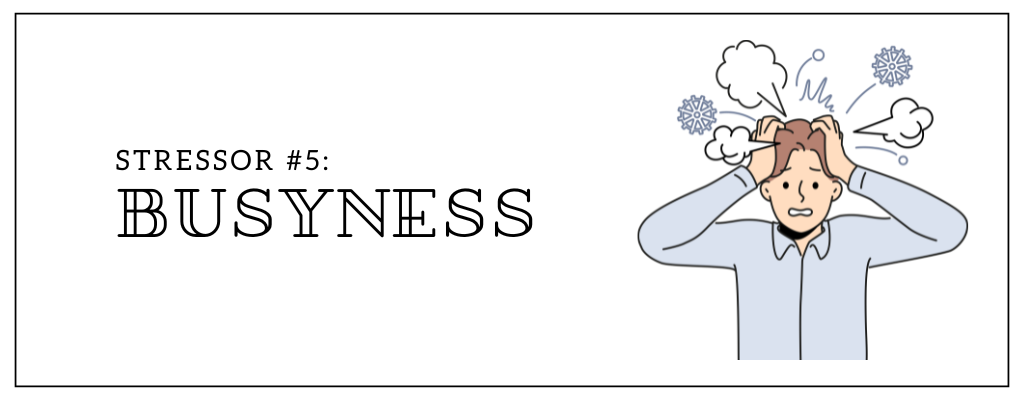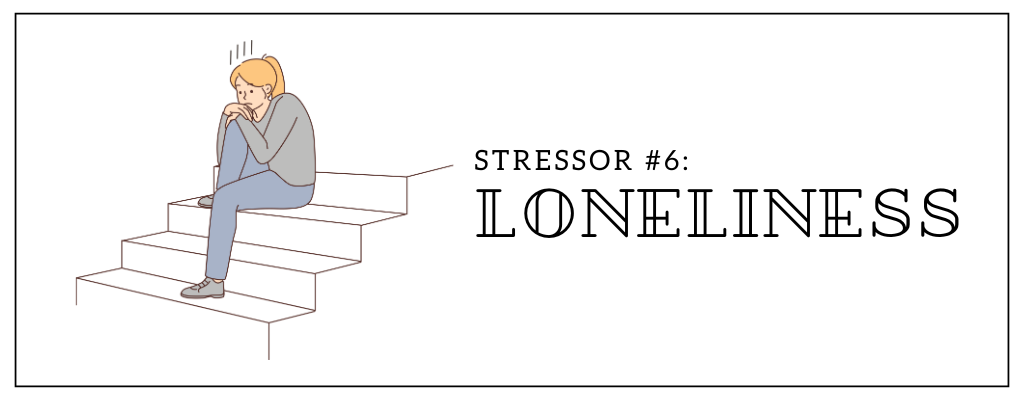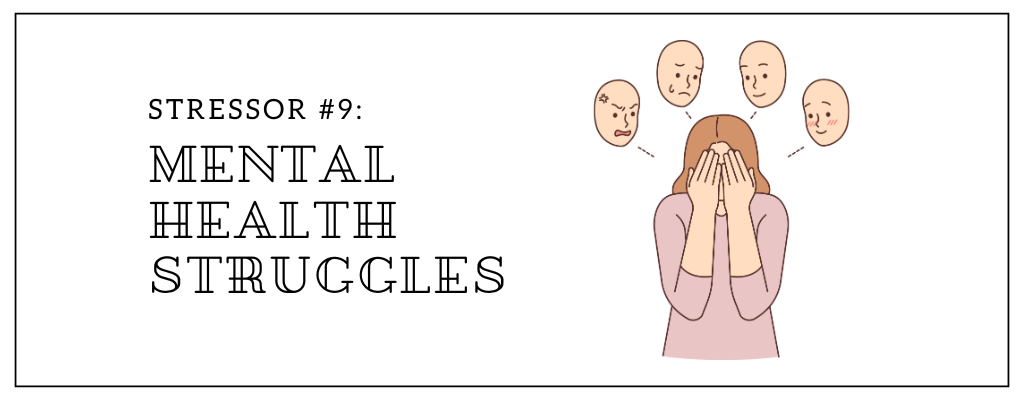9 Holiday Stressors and What to Do About Them (While Taking Care of Your Mental Health)
Stores are now bursting with holiday decorations… candy canes, evergreen trees (both plastic and real), an advent calendar of socks, a menorah shaped like a weiner dog… pretty much anything to cash in on the season. Many people love the holiday season and that’s wonderful if you do. However, it’s important to acknowledge that for many individuals, the holidays can be really challenging and they’re more than eager for the festivities to end.
In a (chest)nutshell: having the holiday blues can be tough, but if you have them—know that you’re definitely not alone. So what are some of these stressors, and what can you do to navigate them?
Check out the following list for tips on how to take care of your mental health this holiday season.

Stressor #1: Family
Relationships can be pretty stressful, especially when it comes to the ones we’re born into. Society often places a strong emphasis on family loyalty, and sometimes that can come at a real cost to our well-being, even when we’re dealing with personal challenges, past traumas, or toxic dynamics. Whether you’re navigating a blended family with its competing priorities, trying to handle unruly in-laws, or skillfully sidestepping that uncle who loves to share his favorite conspiracy theories, one thing is clear: family can be a complicated and messy journey.
When it comes to family, setting boundaries is KEY. Here are some quick tips for how to manage boundaries with the ones you love:
1. Identify your boundaries
If you’re not aware of your own limits, it can be tough to establish boundaries with others. Why not take a moment to reflect on what feels comfortable for you (and what doesn’t) ahead of time? This way, you’ll be prepared when someone starts to push those boundaries. Some examples of limits you might consider are the amount of time you spend with certain family members, steering clear of specific conversation topics, or ensuring you carve out some quality alone time. Remember, it’s your responsibility to take care of your needs and advocate for yourself, and doing so is really important!
2. Communicate those boundaries clearly and assertively
- Use “I” statements when expressing your feelings to avoid blaming or accusing others. This approach is not only kind but also strategic, as it boosts the likelihood of being heard. For instance, instead of saying, “You always bring up my past,” you might say, “I feel uncomfortable when we talk about my past.”
- Be specific about what your boundaries are and clearly say so. It’s okay to be direct and just state something like “I’m not comfortable discussing politics this year.”
- Be firm but kind. It’s important to stick to your boundaries, especially when others may not be accustomed to them. Remember, setting a boundary doesn’t have to lead to an argument. Feel free to say “no” when you need to, and kindly reiterate your limits.
3. Practice self-care
It takes time and effort to establish a boundary, especially when it might not be well-received. Remember to take care of yourself so you can continue to advocate for your needs. Making time for breaks, setting limits, and saying “no” are all essential forms of self-care. It’s perfectly okay to prioritize your well-being, even during the holiday season.

Stressor #2: Politics
You may not have noticed, but a pretty big election just happened, and if numbers indicate anything, about half of the country is pretty unhappy about it. It’s none of our business who you voted for or why and we’re happy to keep it that way, but your friends and relatives may not. It’s possible that you yourself may even be the rabble-rouser who brings up politics at the dinner table. This can lead to some passionate debates, hurt feelings, and more than a bit of tension, which can really put a damper on the mood. We’re not suggesting that you should compromise your values for the sake of peace and civility, just be mindful of what you’re diving into! So what should you do when politics comes up at the dinner table? Well, again, it all comes down to respecting boundaries:
- Set a boundary: If you aren’t comfortable talking shop this season it’s okay to state that you’d personally like to avoid the topic and then stay the course. You can even work to steer the topic elsewhere by bringing up something else, like a shared hobby, a recent movie, or even a funny story. As we’ve said before, it’s okay to say “no”.
- Respect others’ boundaries: It’s great to share topics that you’re passionate about, but if someone mentions they’re not comfortable discussing it, it’s important to respect that boundary and hold back. Let’s not push the issue. Everyone has the right to decide how they want to engage in a conversation, just like you do. We owe it to the people we care about to be mindful of their feelings and experiences.

Stressor #3: Alcohol
A hot toddy, a splash of eggnog, a glass of wine (or a few)—we all have our own unique relationship with alcohol, ranging from abstinence to regular use. During the holidays, alcohol, celebration, and tradition come together, which can make things even more complicated. Perhaps you’ve decided it’s time to take a break from alcohol… or maybe even part ways completely. You might be trying to cut back on your drinking but feel that being around it makes it hard to resist. You may be in recovery but haven’t felt ready to share your journey with others yet. Or maybe you have concerns about someone else’s drinking habits. These situations can certainly cause anxiety, but the best approach is to come prepared with a thoughtful plan.
1. If you’re not drinking:
- You don’t owe anyone an explanation. It’s nobody’s business but yours why you’re not drinking. If you say no to an offered a drink and people ask why, you don’t have to share that you’re working on recovery or have a health condition or any number of reasons why people opt not to drink. A simple “I’m just trying it out” is more than enough, and most people will get the message and let it go. If someone does get nosy it’s okay to set a boundary and let them know you’d prefer not to talk about it right now and just move on to the next subject.
2. If you’re trying to reduce or stop:
- It really helps to have someone you trust by your side at an event, especially if you want to stick to just one drink or none at all. Sharing your plans with that person can make a big difference. Accountability plays a crucial role, and keeping your goals to yourself can sometimes lead to second-guessing your commitment to cutting back or quitting altogether. You might also think about connecting with a support group beforehand to enhance that accountability and develop some proactive coping strategies together.
3. If you’re dealing with someone else drinking problematically:
- This can be quite challenging, as our control over others is often little to none. After expressing your concerns in a calm and private manner, preferably using “I” statements, it’s really up to them how they choose to respond. The priority here is to take care of yourself, which might mean protecting yourself from the situation, avoiding enabling behaviors, or seeking support from a friend or mental health professional. Remember, your own happiness matters and shouldn’t be compromised for someone else’s drinking.
- Once someone is under the influence, it’s best to steer clear of confrontation, especially in public. If someone isn’t ready to stop drinking, they will likely continue regardless of what you say, so try not to feel responsible for their choices. If you attempt to persuade them to stop and they choose not to, remember that you haven’t done anything wrong, and there’s nothing you could have said or done to change their behavior.

Stressor #4: Money
Gifting is a big part of the holidays in America and there’s a reason why the big box stores put out candy canes and Christmas trees the day after Halloween. Let’s be honest, gifting can really add up! Even if you decide to skip the stores, homemade gifts can be quite time-consuming to create, and those supplies don’t come for free, either. For parents, the desire to give your children a truly magical holiday experience can come with a hefty price tag. Even preparing a feast for a big family gathering can feel like it’s stretching your budget. And for some, keeping up with traditional holiday celebrations is out of reach altogether. Money, expectations, and obligations, they’re all intertwined and let’s be real, financial stress is one of the top sources of anxiety year-round. So, how do we navigate this?
- Let go of shame. There’s no easy fix for money problems but one thing you CAN do is let go of that SHAME. Throw all your “shoulds” out the window. Scale back your expectations—really, let them drop all the way down… into the trash can. Remember, you’re one little human being, not Superman. Despite what society often tells us, our worth isn’t dictated by our finances. Sure, we can’t ignore money entirely, but it shouldn’t be linked to how you feel about yourself. You are more than enough just as you are, presents or no presents, whether dressed to the nines or in an ugly old Christmas sweater. Take a moment to let that sink in: YOU ARE GOOD ENOUGH. Just waking up and being present is already a gift. All the presents, parties, and holiday treats are just extras—just icing on the cake. What truly counts is that you’re here, and that alone makes you invaluable, no exceptions.

Stressor #5: Busyness
There are only so many days in the month, so many hours in the day, and so many minutes in the hour. Honestly, the countdown to celebration time can sometimes feel more like a ticking time bomb than a moment of joyful anticipation. It can be tough to carve out time for all those holiday parties, take the kids to festive events, and enjoy precious moments with family and friends, not to mention tackling that gift shopping if it’s part of your holiday routine. When the season shifts from celebration to obligation, we definitely have an issue on our hands. So, what can we do about it?
- Curate. There are a million things you could be doing right now, and only one that you can. Fear Of Missing Out (or FOMO) is real but really if you’re not having fun, what’s the point? It’s okay to say “no,” and oftentimes necessary. If you can say “no” and you’re feeling overwhelmed, do it, and don’t feel bad about it!
- Be present. Our brains are great at running through our “to-do” list ad nauseam, and it’s easy to worry about all those things we’ve got to do or have coming up. Don’t add to your exhaustion—the past is over and done with and the future isn’t here yet. All of your power to participate and make choices exists in the present moment and that’s where we really need to be. It can be hard, but practicing present-moment mindfulness is a great way to reduce anxiety, calm down, and actually enjoy the experience you’re currently having. Being busy can be tough, but missing out on being present for the things you’re busy with is even tougher. Don’t let life pass you by, take a moment to take a deep breath, ground yourself, and just BE.

Stressor #6: Loneliness
For any number of reasons, some of us don’t have family to go to. Mental health struggles and time may have isolated us from friends and family, in addition to making it harder to meet new people and foster healthy relationships. For aging individuals loneliness can be particularly acute as they begin to lose peers and siblings. Estranged family members may not feel safe or comfortable going home for the holidays. One thing that’s true regardless of who you are is that the more you struggle, the harder it is to reach out, and the easier it is to isolate. Loneliness is tough but we do have a great resource for you to utilize. Our Minnesota Warmline is open every day of the year, including holidays, and we want to hear from you.
Reach out to the Minnesota Warmline
- Call (651) 288-0400 (toll-free at 855-WARMLINE)
- Text “Support” to 85511
- Start an online chat by clicking the “How Can We Help?” chat box at the bottom of the page
For more information about the Warmline go to mentalhealthmn.org/what-we-do/peer-support/minnesota-warmline/

Stressor #7: Religion
Religious traditions are deeply connected to the holiday season. With various celebrations overlapping at the beginning of winter, it really contributes to what we think of as “The Holidays.” Your family or friends might observe specific traditions during this time, or there could be a mix of practices within your group. Perhaps some family members embrace certain traditions while others may not, and the possibilities are endless. Just like politics, religion can sometimes create division, as people often hold strong views and aren’t afraid to share them. Additionally, there are those who have faced religious trauma, making current celebrations feel uncomfortable or unwelcoming for them. Religion can bring up a lot of conflicting feelings, but it’s important to remember that there’s no right or wrong way to celebrate the holidays. When those feelings come up here are some ideas for what to do about them:
- Limit your exposure: If you find religion to be particularly stressful, it might help to put some limits on what you’re willing to expose yourself to. Say “no” to events you’re not comfortable attending and find something else to do instead. Make your own tradition and take the time to practice some self-care! Likewise, if someone wants to practice a religious tradition (like a group prayer) that you’re not comfortable with, it’s okay to pass or quietly step away for a moment. You don’t have to participate in anything you don’t want to.
- Hold space for disagreement: Just because someone holds a different belief than you do doesn’t make either of you wrong. Differences of opinion are natural, and it’s perfectly okay to acknowledge when someone disagrees with you, then move forward. You can still be kind to one another without sharing the same viewpoint, so let’s focus on avoiding judgment and accusations. And while we’re at it, let’s remember to respect each other’s boundaries! If someone expresses discomfort about discussing a certain topic or taking part in a particular tradition, it’s vital to honor that boundary and their right to choose their level of participation.

Stressor #8: Grief
One of the most common emotions people experience during the holidays is grief, particularly for those who have lost someone dear to them. Fond memories of past holidays can stir up deep feelings of sorrow, making it challenging to experience joy. It’s not just about death, though; the end of a relationship or the loss of something meaningful can also lead to grief. Even a longing for what once was, or for things that never came to pass, can bring about a sense of loss and sadness. Grief is difficult and there are no quick fixes but here are some reminders that can help make things a little easier.
- Grieving is a complicated process and there is no “right way” to grieve.
It’s all about experiencing your feelings in your own unique way. Try not to expect grief to simply disappear; instead, understand that it’s something we learn to live with. Over time, things do get a bit lighter, but you might always miss the person you love. - It’s also common to feel numb or indifferent at times, as facing our emotions can feel overwhelming. Remember, feeling is part of the healing process, so be gentle with yourself and meet yourself wherever you are on this journey.

Stressor #9: Regular old mental health struggles
Depression? Anxiety? Psychosis? Mania? These aren’t things we can just tuck away in a corner of the garage for later when it might feel easier to face them (and let’s be honest, does that ever really happen?). Mental health challenges don’t operate on our schedules, and they often demand our attention whether we’re ready or not. Seeing others enjoying themselves—whether it’s real or just a façade—can make it feel like we’re the only ones struggling. This can be really isolating, and when we start comparing our feelings to what we believe we should be experiencing, it can amplify the discomfort we’re already dealing with. The most important thing to remember is this:
- Comparison is the thief of joy. Comparison can really take away from our happiness. When we’re having a tough time with our mental health, it’s easy to be overly critical of ourselves and feel like we’re all alone in our struggles. But here’s the thing: that’s just not the case. Plus, no one else is walking the same path we are, which makes comparisons pretty pointless. Everyone’s journey is unique, and honestly, it doesn’t matter if someone else seems to be doing better because measuring our success against others is just not fair. Mental health battles can make everything feel more challenging, and we really deserve to own our progress. Comparing our achievements to others’ only serves to undermine the hard work we’ve put in. So, let’s be kind to ourselves and embrace where we are with understanding and compassion.
Conclusion
If you’re struggling this year, know you’re not alone. It can be really challenging to feel grateful when bills are piling up, your mental health is taking a hit, or family drama is afoot and it’s completely understandable to feel a bit bah-humbug during these times. But here’s a thought: there’s likely at least one little thing, even if just for a minute, that you can feel grateful for (like having access to toilet paper, maybe?). In those brief moments, try to remind yourself that there are still reasons to enjoy life and to be present. We hope some of these tips resonated with you, and we want you to remember that you truly matter, your feelings are valid, and you deserve happy holidays, no matter how they unfold.